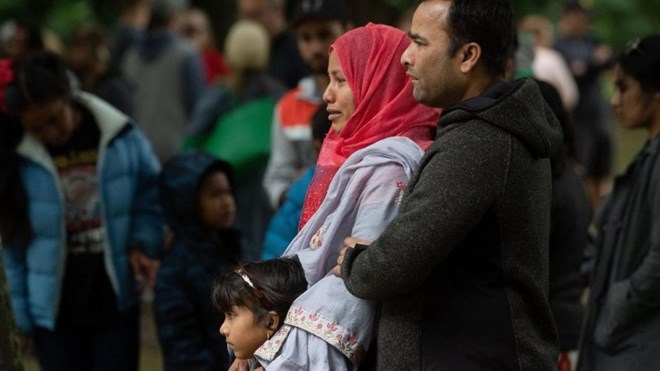
Thursday March 16, 2023
By Hande Taner , Nourhene Mahmoudi
It's fitting that the fourth anniversary of the Christchurch attack is the first International Day to Combat Islamophobia. Let it be a global wake-up call about the dangers of this vile hatred
Three-year-old Mucad Ibrahim was the youngest victim of the mass shootings in Christchurch, New Zealand. (Abdi Ibrahim/AP)
His family had fled Somalia during the war and flown to New Zealand as refugees. There they hoped to turn a new page on the atrocities they had seen and begin a new life. Tragically, it was not to be.
In 2022, the General Assembly of the United Nations adopted a resolution proclaiming 15 March as the International Day to Combat Islamophobia, in order to mark the horrific act of terrorism carried out by Brenton Tarrant, a white supremacist who opened fire in two Christchurch mosques, killing 51 Muslims and injuring 40.
The resolution invited governments worldwide to observe the day and urged the strengthening of institutional efforts with the purpose of fostering global peaceful dialogues and promoting a culture of peace and tolerance.
The 15 March 2019 was a dark day for humanity. Worshippers praying peacefully were heinously killed in cold blood on a Friday, a day that represents peace and spirituality for Muslims. This violent and unforgivable carnage occurred in the name of hatred and supremacy over disfranchised groups and marginalised communities.
Islamophobia is defined thus by the Office of the United Nations High Commissioner for Human Rights: “A fear, prejudice and hatred of Muslims or non-Muslim individuals that leads to provocation, hostility and intolerance by means of threatening, harassment, abuse, incitement and intimidation of Muslims and non-Muslims, both in the online and offline world.
"Motivated by institutional, ideological, political and religious hostility that transcends into structural and cultural racism which targets the symbols and markers of a being a Muslim.”

A Muslim family stands across the road from Christchurch's Dean Street mosque on 17 March 2019, two days after worshippers were gunned down while praying (AFP)
Misleading narrative
This vicious phenomenon threatens our democracy, and it ostracises Muslims from the daily life of society. It hinders their access to the jobs market and education systems, where they are often not treated fairly and equitably.
The racialisation of Muslims leads to the portrayal of a deceptive image and a biased social construction, which results in their alienation, dehumanisation and demonisation, among other things.
This manufactured and misleading narrative, which blindly ignores the many advances that Muslims have contributed to over the centuries (from maths to the sciences, from medicine to astronomy), sees them no longer as human beings but as the “dangerous intruder”.
Furthermore, Muslim women suffer the most from the visible and invisible impacts of intersectional discrimination, ones that exclude them from different areas of life: employment, education and public spaces.
They are the victims of a vicious discriminatory cycle, from which it seems hard to escape. Institutions cannot aspire to equality if they are not considerate of all racialised communities, including the gendered characterisations of Islamophobia; otherwise they will only have a selective and biased commitment towards the principle of equality.
Wake-up call
We can no longer ignore the detrimental effects on the lives of Muslims that come from institutional, systemic and structural Islamophobia embedded in the same structures responsible for protecting human rights and upholding the universal values of the UN human rights charter.
The Christchurch attack should have provoked the consciousness of decision-makers across the world and prompted them to question their political commitment against racism and specifically Islamophobia.
The internalisation and understanding of Islamophobia cannot simply be reduced to a hateful online tweet, and should be seen and recognised for what it is: a cancerous disease that poisons our communities, and an anomaly in our democratic political systems.
As next week's International Day for the Elimination of Racial Discrimination approaches, EU member states should adopt the UN's national action plans, which should include the recognition of all forms of racism, including Islamophobia, harmonised and disaggregated data collection, as well as participatory and inclusive mechanisms with civil society organisations.
When we look at pictures of little Mucad, we see failure. We look at his big expressive eyes and think that we have failed him, and we will keep failing all future Mucads if Islamophobia is not addressed holistically, effectively and adequately.
But we are hopeful that Mucad and the other 50 victims of the terrorist attack did not die in vain. We are hopeful that their deaths hold a deeper meaning and perhaps can represent a wake-up call for institutions to really internalise the dangers that Islamophobia represents and start acting accordingly.
Mucad's innocent face should be a reminder of why anti-Muslim hatred cannot go unchallenged anymore. Because Islamophobia is harmful; Islamophobia kills.
The views expressed in this article belong to the authors and do not necessarily reflect the editorial policy of Middle East Eye.